 In the majority of inspections, the situation looks like this:
In the majority of inspections, the situation looks like this:
- The buyer pays for the inspection, and wants the inspector to be objective. If anything, the inspector should be too tough with the supplier, not too easy.
- The supplier receives the inspector and hopes his products are not held to too high a standard.
And the position of the inspection company should be pretty clear: the inspector looks for information based on his checklist, which itself is based on the specs required by the buyer.
A good way to judge your inspection firm’s professionalism is to ask them to be tougher for a particular job. If they accept to play this game, you know how objective they really are. And you can imagine the inspectors’ reaction when it is the supplier’s turn to ask for “understanding”…
There is another reason to remain objective and base everything on the client’s checklist. Sometimes the buyer does not ask us to be tough, but on the contrary to produce a nice report and avoid showing too many defects/discrepancies.
For example, one of my clients imports regular orders for their collections (this is a classic wholesaler activity) and also place some “special orders” for large individual retailers (this is more of an import agent activity). These large buyers usually ask for production samples. And sometimes they find some quality issues. In this case they tell the importer to perform an inspection and show them the report, or the order is canceled.
What can an inspection company do? On the one hand, we can’t bend our rules and give “special guidelines” to inspectors. Nor can we alter the findings. But on the other hand we have to help our client find a way out of this trap if the products can be sold in stores without any risks.
Usually the final buyer will only need to see a passed report, and won’t look at all the details. Therefore I found that two things were acceptable:
- The product specs usually originate in part from the importer, who can decide to modify them prior to inspection. This is perfectly legitimate. For example, if the tolerance on a measurement point is +/- 1/2”, it can be slightly enlarged. Of course, we should make it obvious in the report that these tolerances were given by the importer.
- Another trick is to collect the findings and send a draft to the importer really fast, and keep the result as “pending client’s decision” or “on hold”. If the findings are not exactly conform but do not justify an order cancellation, the importer can accept them. Then we can write “Passed – applicant judged these findings were commercially acceptable even though they are not strictly conform to original checklist”.
Am I going too far? Am I too careful? What do you think?
